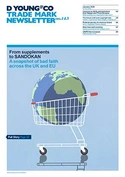Important changes to the Trade Marks Act & Rules January 2019
The Trade Marks Act 1994 (TMA) and Trade Marks Rules 2008 are due to change following implementation by the UKIPO of the EU Trade Mark Directive 2015. This article sets out a summary of the various changes due to come into effect on 14 January 2019.
Representation of a trade mark
The TMA will no longer specify that a trade mark be represented graphically. This in turn will make it possible to secure protection for a wider range of marks such as those that incorporate sound, motion, multimedia and holograms. However, whilst the UKIPO (and EUIPO) will now accept these ‘new’ types of marks it will not be possible to use them as base registrations for international registrations, as graphical representation remains a requirement at WIPO.
Extension of technical function prohibition
The technical function prohibition will be extended to cover not just shapes but any characteristic which is intrinsic to the goods being applied for.
Notification of earlier rights
The UKIPO will no longer cite marks in search reports or at examination that have expired (although it may be possible those marks are later restored by late renewal).
Oppositions - proof of use
The relevant period to provide evidence of use in opposition proceedings will change to the five year period preceding the filing (or priority) date of the opposed mark.
Collective marks
- The definition of who can hold a collective mark will be extended to include ‘legal persons governed by public law’ and the nature of the associations which may be holders has been clarified.
- Regulations concerning the use of a collective mark must include conditions of use and sanctions if the mark has been misused.
- If a collective mark contains a certain geographical area, the regulations must allow any person whose goods or services originate in that region to become an authorised user (as long as they meet all other conditions).
- It will become possible for a member of the association (an authorised user) to take legal action against a potential infringer if there are agreements or permissions in place for them to do so, as well as intervene in infringement proceedings before the court to obtain damages.
Goods in transit / counterfeits
Where goods passing through the UK are detained, the law will change to require the person shipping the goods to prove there is no applicable right to stop the goods being marketed in the country of destination. The provisions relating to infringement will also be extended to give greater scope for taking enforcement action against those preparing to counterfeit goods.
Generic terms in dictionaries
Where a publisher incorrectly identifies a trade mark as a generic term in a dictionary it will be possible to ask the publisher to make it clear the entry is in fact a registered trade mark. If not done promptly it will be possible to seek assistance from the Court to order the correction, destroying of existing copies and/or other remedies at the Court’s discretion.
Trade marks registered incorrectly in the name of an agent or representative
It will be made possible to take action against a trade mark filed or registered in the name of an agent or representative whether or not that party is based within the UK or elsewhere.
Infringement cases
The following changes will come into effect regarding infringement cases:
- It will no longer be necessary to take separate invalidation action against a registered UK trade mark before or alongside infringement proceedings. The Courts will now consider invalidation-related issues during the course of infringement proceedings.
- The use of a trade or company name (or part of that name) will be specifically included within the list of infringing acts.
- The ‘own name’ defence will only apply to personal names and no longer apply to use of a company name.
- As a defence in infringement proceedings it will be possible to request proof of use of the earlier mark (where applicable) to remove the need to file separate revocation proceedings to contest its validity.
- The fact an earlier similar mark was listed ‘expired’ at the time of applying to register a later trade mark may, in certain circumstances, provide a defence against infringement proceedings.
Invalidation cases – proof of use
Where a mark relied on has been registered over five years it will become possible for the holder of the contested mark to not only request proof of use for the five year period running up to the filing of the invalidation action, but also the five year period prior to the filing (or priority) date of the contested mark.
Licences
- It will be possible for trade mark owners to take legal action under trade mark law where a licensee fails to observe the provisions in the licence including how long it lasts, the way the mark is used, what goods or services are covered, the geographic area of use and quality of the goods or services.
- It will be possible for a licensee under an exclusive licence to take legal action against an infringer should permission to do so be refused or not forthcoming from the trade mark holder. Licensees with a non-exclusive licence will still require permission.
- A licensee will be able to intervene in infringement proceedings before the Court to obtain damages.
- The provisions will be extended to pending applications as well as registrations.
Division of marks
The existing provisions will be extended to include registrations.
Renewals
The UKIPO will start sending renewal reminders six months before a mark expires (presently four months before). When filing a late renewal it will become necessary to demonstrate that the failure to renew was ‘unintentional’ (previously the test considered whether it was ‘just’ to allow the late renewal).
